Related Research Articles

Juvénal Habyarimana was a Rwandan politician and military officer who served as the second president of Rwanda, from 1973 until his assassination in 1994. He was nicknamed Kinani, a Kinyarwanda word meaning "invincible".

Paul Kagame is a Rwandan politician and former military officer who has been the fourth President of Rwanda since 2000. He was previously a commander of the Rwandan Patriotic Front (RPF), a rebel armed force which invaded Rwanda in 1990. The RPF was one of the parties of the conflict during the Rwandan Civil War and the armed force which ended the Rwandan genocide. He was considered Rwanda's de facto leader when he was Vice President and Minister of Defence under President Pasteur Bizimungu from 1994 to 2000 after which the vice-presidential post was abolished.

The United Nations Assistance Mission for Rwanda (UNAMIR) was established by United Nations Security Council Resolution 872 on 5 October 1993. It was intended to assist in the implementation of the Arusha Accords, signed on 4 August 1993, which was meant to end the Rwandan Civil War. The mission lasted from October 1993 to March 1996. Its activities were meant to aid the peace process between the Hutu-dominated Rwandese government and the Tutsi-dominated rebel Rwandan Patriotic Front (RPF). The UNAMIR has received much attention for its role in failing, due to the limitations of its rules of engagement, to prevent the Rwandan genocide and outbreak of fighting. Its mandate extended past the RPF overthrow of the government and into the Great Lakes refugee crisis. The mission is thus regarded as a major failure.

The Rwandan Patriotic Front, is the ruling political party in Rwanda.

The Rwandan genocide, also known as the genocide against the Tutsi, occurred between 7 April and 19 July 1994 during the Rwandan Civil War. During this period of around 100 days, members of the Tutsi minority ethnic group, as well as some moderate Hutu and Twa, were killed by armed Hutu militias. Although the Constitution of Rwanda states that more than 1 million people perished in the genocide, the actual number of fatalities is unclear, and some estimates suggest that the real number killed was likely lower. The most widely accepted scholarly estimates are around 500,000 to 800,000 Tutsi deaths.
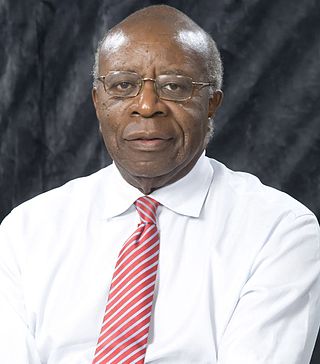
Faustin Twagiramungu was a Rwandan politician. He was Prime Minister of Rwanda from 1994 until his resignation in 1995, the first head of government appointed after the Rwandan Patriotic Front (RPF) captured Kigali. He soon came to disagree with the RPF's policies and actions, resigned and was placed under house arrest, but managed to leave the country and settle in Belgium. He continued his opposition activity against Paul Kagame's rule, subsequently returning to Rwanda and standing for elections, but without success.

Pasteur Bizimungu is a Rwandan politician who served as the third President of Rwanda, holding office from 19 July 1994 until 23 March 2000.
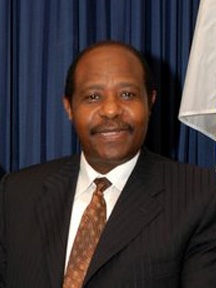
Paul Rusesabagina is a Rwandan human rights activist. He worked as the manager of the Hôtel des Mille Collines in Kigali, during a period in which it housed 1,268 Hutu and Tutsi refugees fleeing the Interahamwe militia during the Rwandan genocide. None of these refugees were hurt or killed during the attacks.
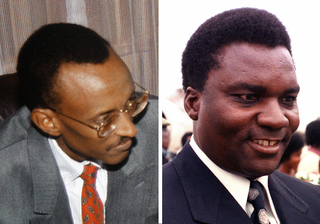
The Rwandan Civil War was a large-scale civil war in Rwanda which was fought between the Rwandan Armed Forces, representing the country's government, and the rebel Rwandan Patriotic Front (RPF) from 1 October 1990 to 18 July 1994. The war arose from the long-running dispute between the Hutu and Tutsi groups within the Rwandan population. A 1959–1962 revolution had replaced the Tutsi monarchy with a Hutu-led republic, forcing more than 336,000 Tutsi to seek refuge in neighbouring countries. A group of these refugees in Uganda founded the RPF which, under the leadership of Fred Rwigyema and Paul Kagame, became a battle-ready army by the late 1980s.
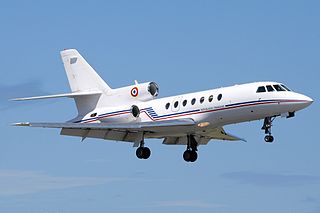
On the evening of 6 April 1994, the aircraft carrying Rwandan president Juvénal Habyarimana and Burundian president Cyprien Ntaryamira, both Hutu, was shot down with surface-to-air missiles as their jet prepared to land in Kigali, Rwanda; both were killed. The assassination set in motion the Rwandan genocide, one of the bloodiest events of the late 20th century.

Fernando Andreu Merelles is a judge of the Audiencia Nacional in Spain. He plays a leading role especially in humanitarian law and in pursuing war-crime and similar issues. Such investigations are made possible by Spain's principle of universal jurisdiction in alleged cases of crimes against humanity, genocide, and terrorism.
Seth Sendashonga was the Minister of the Interior in the government of national unity in Rwanda, following the military victory of the Rwandan Patriotic Front (RPF) after the 1994 genocide. One of the politically moderate Hutus in the National Unity Cabinet, he became increasingly disenchanted with the RPF and was eventually forced from office in 1995 after criticizing government policies. After surviving a 1996 assassination attempt while in exile in Kenya, he launched a new opposition movement, the Forces de Résistance pour la Démocratie (FRD). Sendashonga was killed by unidentified gunmen in May 1998. The Rwandan government is widely believed to be responsible for the assassination.
Abdul Joshua Ruzibiza was a former member of the Rwandan Patriotic Front who, at one time, claimed to be part of a group that carried out assassinated President of Rwanda Juvénal Habyarimana and Burundian president Cyprien Ntaryamira in April 1994, an event that marked the beginning of the Rwandan genocide.
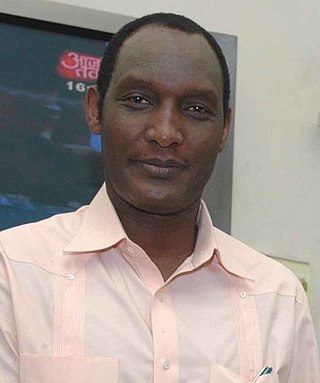
Faustin Kayumba Nyamwasa is a Rwandan former Lieutenant general who formerly was the Chief of Staff of the Rwandan Army from 1998 to 2002. He was also head of Rwandan intelligence from 1998 to 2002 and served as Rwanda's ambassador to India between 2004 and 2010. Nyamwasa has been an opposition leader in exile since as part of the Rwanda National Congress.

Patrick Karegeya was a head of intelligence in Rwanda. He was a member of the Rwandan Patriotic Front (RPF) group that took power in Rwanda following the genocide and civil war. After becoming a critic of RPF leader Paul Kagame, he was stripped of his rank and jailed. Following a time in exile, he was assassinated in Johannesburg, South Africa on December 31, 2013.
The Rwanda National Congress (RNC) is Rwandan opposition group in exile, established in the United States on 12 December 2010. Prominent founders included Dr. Theogene Rudasingwa, Gen. Kayumba Nyamwasa, Gerald Gahima, and Patrick Karegeya. Karegeya was murdered on 31 December 2013. Rudasingwa and Gahima have since left the organization.

The role of France in the 1994 genocide against the Tutsi has been a source of controversy and debate both within and beyond France and Rwanda. France actively supported the Hutu-led government of Juvénal Habyarimana against the Tutsi-dominated Rwandan Patriotic Front, which since 1990 had been engaged in a conflict intended to restore the rights of Rwandan Tutsis both within Rwanda and exiled in neighboring countries following over four decades of anti-Tutsi violence. France provided arms and military training to Habyarimana's militias, the Interahamwe and Impuzamugambi, which were among the government's primary means of operationalizing the genocide following the assassination of Juvénal Habyarimana and Cyprien Ntaryamira on April 6, 1994.

Colonel Alexis Kanyarengwe (1938–2006) was a Rwandan officer who fled Rwanda in 1980 amidst accusations that he was plotting against Juvénal Habyarimana.

In Praise of Blood: The Crimes of the Rwandan Patriotic Front is a 2018 non-fiction book by Canadian journalist Judi Rever and published by Random House of Canada; it has also been translated into Dutch and French. The book describes alleged war crimes by the Rwandan Patriotic Front (RPF), Rwanda's ruling political party, during its ascent to power in the 1990s.

Do Not Disturb: The Story of a Political Murder and an African Regime Gone Bad is a 2021 book by British journalist Michela Wrong, published by Fourth Estate and PublicAffairs. The book focuses on the 2014 murder of Rwandan defector Patrick Karegeya, for which the Rwandan government denied responsibility.
References
- ↑ Twagilimana, Aimable (2015). Historical Dictionary of Rwanda. Rowman & Littlefield. p. 201. ISBN 9781442255913.
- ↑ Exiled foes live in fear of Kagame by Donna Bryson, Associated Press, in The Washington Times , 26 January 2011. Retrieved 4 January 2014. Archived here.
- 1 2 RNC Leader Theogene Rudasingwa Testifies Against Rwandan Paul Kagame in Spanish High Court AfroAmerica Network, 14 October 2013. Retrieved 4 January 2014. Archived here.
- ↑ Rwanda genocide: Kagame 'cleared of Habyarimana crash' BBC News , 10 January 2012. Retrieved 4 January 2014.